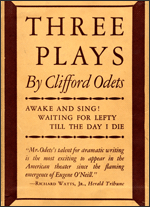Radical Appeals to the Literati

Three Plays.
Clifford Odets.
New York: Covici-Friede Publishers, 1935.
While Eugene O’Neill’s naturalistic plays paved the way for the proletarian dramas of the Thirties, the ease of his dialogue and his intimate knowledge of the settings, not to mention his tragic vision, achieved a poignancy that his sermonizing successors could never reach. Nevertheless, the established playwright Elmer Rice won the Pulitzer Prize in 1929 for Street Scene, an artlessly moving drama that utilized a New York City tenement block, and went on to the more strident We the People (1933) and Judgment Day (1934), which were among the more effective agit-prop (agitation-propaganda) plays. It was, however, a new voice that best mirrored the radical aspirations in the theatre of the 1930s. Clifford Odets (1906-1963) was acclaimed by both the critics and the revolutionary vanguard alike for Waiting for Lefty (1935), based on the New York taxi cab strike of the preceding year, with the action laid in a union hall. This success prompted the staging in 1935 of his earlier Awake and Sing, his most personal and touching play, set in the Jewish ghetto. It was produced by The Group Theatre, founded in New York in 1931, a company that produced contemporary plays dealing with social issues. With the Group Theatre also mounting Till the Day I Die, one of the first anti-Nazi dramas, Odets had three plays running simultaneously on Broadway and aroused more discussion than any American dramatist since O’Neill. Golden Boy (1937), about a young man who gives up his career as a violinist to ruin his hands in the boxing ring, was a popular success that has had a number of revivals.